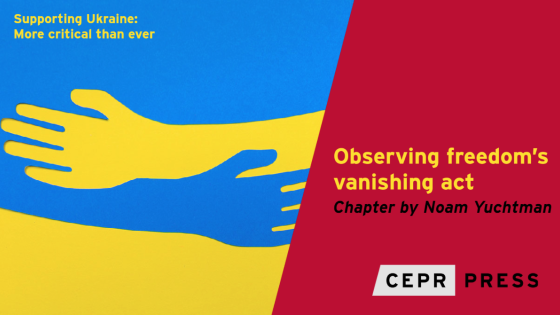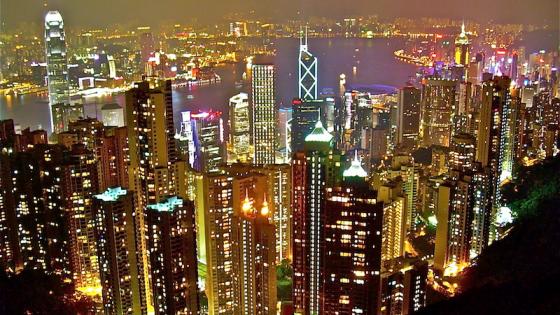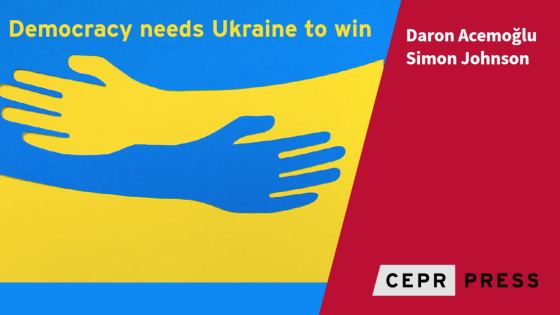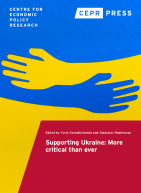Editors' note: This column is taken from a new CEPR eBook, Supporting Ukraine: More critical than ever, available to download here.
Between 2014 and 2019, much of my academic research was focused on understanding individuals’ participation in protests that were part of Hong Kong’s democratic movement (Cantoni et al. 2019, Bursztyn et al. 2021, Cantoni et al. 2022). My co-authors and I spent many stimulating days in Hong Kong discussing the protests with each other and with leaders of the movement – ranging from idealistic high school students to thoughtful university professors.
We did this work within the political institutions of Hong Kong at the time: under the Basic Law, freedom of expression and assembly as well as adherence to the rule of law were constitutionally enshrined and visible throughout society. I recall attending a 1st July march in Hong Kong, held every year as a protest against Chinese Communist Party (CCP) rule, in which Hong Kong police officers protected a group of individuals with signs promoting Hong Kong’s independence. Further on in the march, effigies of the Chief Executive of Hong Kong (the head of government) served as punching bags. This political speech was fully protected and legal, and as such, our work studying democratic protests was institutionally supported by university collaborators in Hong Kong.
Yet, in the blink of an eye, Hong Kong’s political equilibrium was fundamentally altered. On 30 June 2020 (just before the yearly march), the CCP imposed a National Security Law on Hong Kong that coercively suppressed protests. The protest leaders with whom we met – whether students, politicians, or university professors – were arrested. This signalled the CCP’s abandonment of its commitment to a ‘one country, two systems’ arrangement – which had guaranteed civil liberties in Hong Kong that were absent in mainland China – in favour of a system of total political control.
My co-authors and I wrote about the importance of active protests for preserving ‘one country, two systems’ while it was still in force (Cantoni et al. 2017). In the absence of democratic checks and balances, we argued, popular mobilisation was crucial to prevent authoritarian overreach. Indeed, such mobilisation was previously effective in forcing policy reversals on national security legislation, curricular reform, and a proposed extradition bill. Once the threat of mobilisation was neutralised by the National Security Law, civil liberties crumbled: Hong Kong citizens lost the freedom of the press, freedom of speech, and freedom of association they had previously enjoyed (e.g. Freedom House 2022).
My co-authors and I experienced the change personally as well: our institutional collaborators turned adversarial toward us and largely abandoned their collaboration in our research. Pro-CCP newspapers in Hong Kong and even the Chief Executive of Hong Kong, Carrie Lam, suggested that our research was aimed at inciting violence or interfering in Hong Kong politics.
The experience was as unpleasant as it was absurd.
What are the lessons I take from my experience in Hong Kong for thinking about the democratic world’s response to Russia’s invasion of Ukraine? Having experienced close at hand a vibrant, free society transformed so quickly into an oppressive, unfree one was a shock. Had I not experienced it so directly, I might not have believed such a rapid loss of civil liberties was possible. Hong Kong thus serves as a warning: freedoms that we enjoy and take for granted can be made to disappear very quickly – and there exist powerful political actors who actively want to make them disappear. The world’s democratic powers acquiesced to China’s reneging on its international commitments to preserve ‘one country, two systems’, and the Hong Kong we knew was lost. If the democratic powers do not contribute to the stand against Vladimir Putin’s aggression, then Ukraine as we know it will be lost as well.
Yet, it doesn’t end there. Each case of authoritarian aggression and democratic acquiescence appears to encourage the former. Does anyone doubt that Xi Jinping became more confident that he could extend authoritarian CCP rule to Taiwan as a result of the ease with which he extended it over Hong Kong? The lesson applies easily to Ukraine and to Eastern Europe more broadly – all the more so having observed how, incrementally, Putin moved from Crimea to the Donetsk and Luhansk regions of Ukraine. The countries of Eastern Europe today enjoy civil liberties and the rule of law; Hong Kong very recently enjoyed these as well, until they were brutally taken. The shadow of an authoritarian threat can materialise all too quickly into actual authoritarian repression, and then freedom vanishes. By helping preserve democracy in Ukraine, we help preserve democracy everywhere.
References
Bursztyn, L, D Cantoni, D Y Yang, N Yuchtman and Y J Zhang (2021), “Persistent political engagement: Social interactions and the dynamics of protest movements”, American Economic Review: Insights 3, No. 2: 233–50.
Cantoni, D, L-J Heizlsperger, D Y Yang, N Yuchtman and Y J Zhang (2022), “The fundamental determinants of protest participation: Evidence from Hong Kong’s antiauthoritarian movement”, Journal of Public Economics 211: 104667.
Cantoni, D, D Y Yang and N Yuchtman (2017), “Power to the People?” LSE Management Blog.
Cantoni, D, D Y Yang, N Yuchtman and Y J Zhang (2019), “Protests as strategic games: experimental evidence from Hong Kong's antiauthoritarian movement”, The Quarterly Journal of Economics 134(2): 1021–1077.
Freedom House (2022), “Hong Kong”, Freedom in the World (last accessed 13 February 2023).



